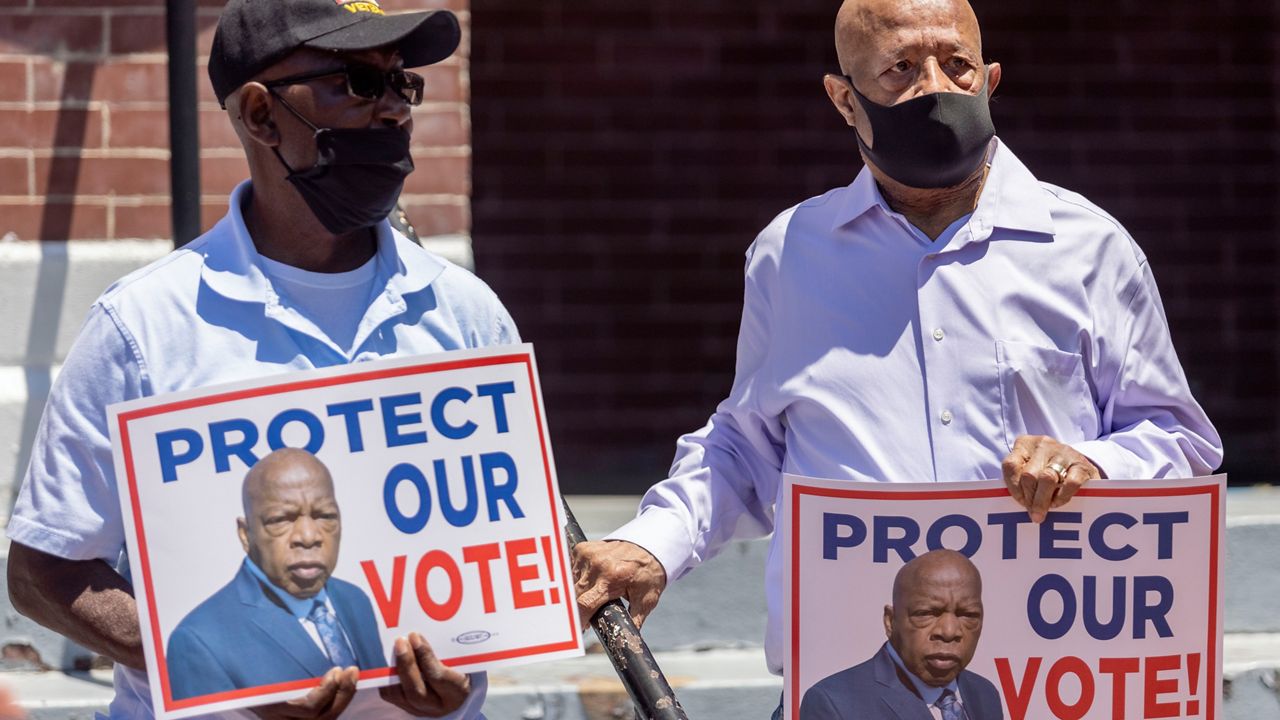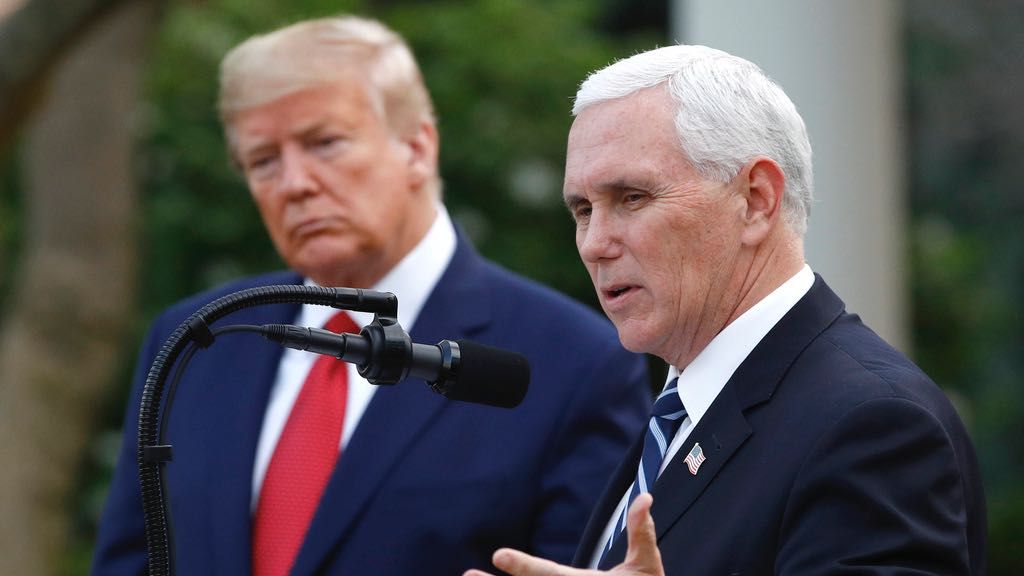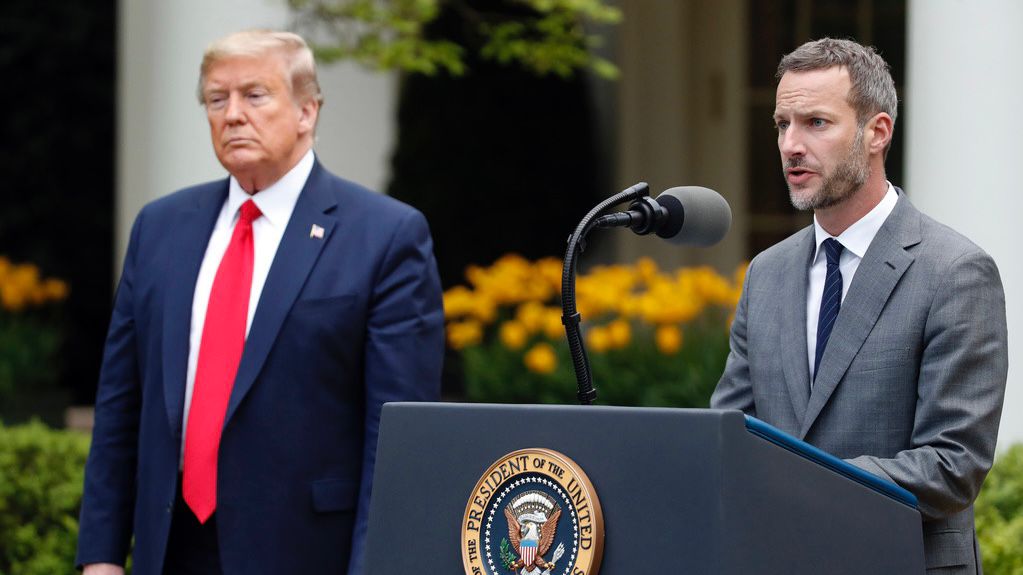Senate Republicans have once again blocked Democrats’ latest attempt to pass significant voting rights legislation, this time thwarting a bipartisan compromise on the John Lewis Voting Rights Advancement Act.
With Vice President Kamala Harris presiding over the chamber, the bill failed, 50-49, marking the second time Republicans have filibustered voting rights legislation in the last two weeks, and the fourth time this year. Senate Majority Leader Chuck Schumer, D-N.Y., changed his vote from a yes to a no so the bill can be considered again later.
"We will continue to fight for voting rights and find an alternative path forward even if it means going at it alone," Schumer said after the vote.
Named for the late Georgia Congressman and staunch voting rights advocate, the bill aims to restore portions of the landmark Voting Rights Act of 1965, including once again requiring “preclearance” from the Justice Department or federal courts before states and jurisdictions can enact voting restrictions.
That provision of the law was gutted by the Supreme Court’s 2013 decision in Shelby County v. Holder. Another provision the bill, which aims to boost protections against discrimination, was limited by the high court’s decision in Brnovich v. Democratic National Committee earlier this year.
In 2006, the Voting Rights Act was reauthorized in a unanimous 98-0 vote, and has been reauthorized under presidents of both parties.
The bill was Democrats’ latest attempt to beat back restrictive voting measures being introduced and enacted in Republican-led statehouses across the country.
On Tuesday, Sens. Lisa Murkowski, R-Alaska, Joe Manchin, D-W.Va., Dick Durbin, D-Ill., and Patrick Leahy, D-Vt., announced a bipartisan agreement on the bill, with the aim of garnering enough GOP support to overcome the Senate’s 60-vote legislative filibuster threshold.
"Protecting our foundational right to vote is bigger than party; it is about our democracy," Leahy wrote. "As we have done many times before, we must put aside our differences and come together to preserve what is most precious about our country: a system of self-government of, by, and for the people. That is what this bill does."
"Voting rights are fundamental to our democracy and how we protect them defines us as a nation," Murkowski said, touting the bill's inclusion of the the Native American Voting Rights Act, which addresses "some of the long-standing obstacles that American Indians and Alaska Natives face" in voting.
"Every American deserves equal opportunity to participate in our electoral system and political process, and this bill provides a starting point as we seek broader bipartisan consensus on how best to ensure that," she added.
"The Voting Rights Act has been bipartisan since 1965," Manchin wrote. "I commend my friend and colleague Senator Lisa Murkowski for keeping that bipartisan tradition alive despite partisan efforts on both sides of the aisle to prevent that from happening."
The bill also had the full support of the Biden administration, with the Office of Management and Budget writing in a statement that the measure "would strengthen vital legal protections to ensure that all Americans have a fair opportunity to participate in our democracy."
"In an essay published shortly after he died, Congressman John Lewis wrote, 'Democracy is not a state. It is an act[.]' This bill not only bears John Lewis’s name, it heeds his call," the statement continues. "The Administration looks forward to working with Congress as the VRAA proceeds through the legislative process to ensure that the bill achieves lasting reform consistent with Congress’ broad constitutional authority to protect voting rights and to strengthen our democracy."
But it fell far short of the 60-vote threshold, with only one Republican, Sen. Murkowski, supporting the bill. Biden after the vote expressed severe disappointment in the bill's failure.
"Today, once again, Senate Republicans blocked debate on the bipartisan John R. Lewis Voting Rights Advancement Act," Biden wrote. "Provisions in the bill have passed the Senate with overwhelming bipartisan support five times."
"Let there be a debate and a vote," he added.
The failure of the bill will no doubt bring up calls to abolish the filibuster to address voting rights.
""I am deeply appalled that our colleagues on the other side of the aisle once again blocked our efforts to even debate this critical issue," Georgia Sen. Raphael Warnock said, pledging: "I am undeterred in the march to pass federal voting rights legislation this Congress."
"One Republican supporting the John Lewis Voting Rights Advancement Act is shocking enough," Washington Rep. Pramila Jayapal, the chair of the Congressional Progessive Caucus, wrote on Twitter. "But were we able to get 9 more on board? No, of course not."
"End the filibuster so we can deliver on voting rights, a $15 minimum wage, equal pay, and more," she added.
"Today the motion to proceed with a vote John Lewis Voting Rights Advancement Act failed to pass the Senate on a 50-49 vote," the American Civil Liberties Union wrote on Twitter. "It’s time for Senators to figure out a way to work around the filibuster as the obstacle to voting rights legislation."
"They don't want people like us to have access to voting," Michigan Rep. Rashida Tlaib wrote on Twitter. "It is clear. Time to #AbolishtheFilibuster!"
"Blocking Congressional debate on voting rights is white supremacy in the electoral process," Mass. Sen. Ed Markey wrote on Twitter after the vote. "We must abolish the Jim Crow filibuster."
We can’t keep bringing these bills to the floor for Republicans to block even beginning debate," Washington Sen. Patty Murray said. "Whatever we’ve got to do to pass voting rights, even an exemption to the filibuster, I believe we should do it. We cannot let a Senate procedure stop us from protecting the right to vote."
"This move by Senate Republicans is further evidence not only that they remain committed to voter suppression for partisan purposes but also that the filibuster, an instrument of gridlock, must be eliminated for the sake of our democracy," House Majority Leader Steny Hoyer, D-Md., wrote in a statement. "In spite of Republican obstruction, Democrats in Congress remain committed to the fight for voting rights and will continue to deliver, For the People, legislation that protects our democracy and defends the rights guaranteed under our Constitution."
Time for a reality check: Senate Republicans will NEVER vote to protect voting rights," California Rep. Adam Schiff, the Chair of the Intelligence Committee, wrote on Twitter. "We have to stop waiting for the fever to break."
"It’s time to end the filibuster and start legislating like our democracy is on the line," he added. "Because it is.








